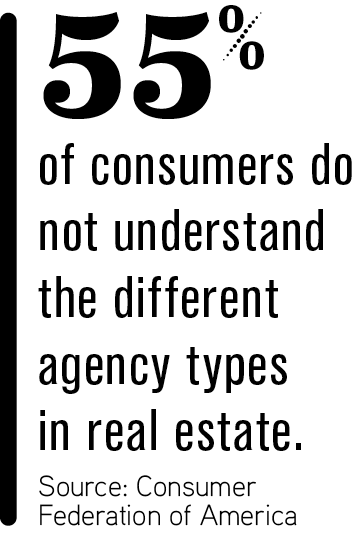Dual agency, or representing both the buyer and seller in a transaction, can result in both efficiencies and challenges for agents
By Regina Ludes
In her 25 years in real estate, Kim Kerbis, CRS, says she acts as a dual agent every now and then.
“It comes up at least once every few years,” says Kerbis, broker with @properties Christie’s International Real Estate Brokerage in Chicago, Illinois. While dual agency has its place, Kerbis says she prefers to work with other agents. “I believe it’s a better experience for buyers and sellers as well as for agents,” she explains.
Ask any real estate agent their feelings about dual agency, and you’ll likely get a range of responses—from enthusiastic support to anger and distrust. Some agents say it’s a boon for their business and creates a smooth transaction experience for all parties, while others say it’s a conflict of interest. Despite the controversy, dual agency isn’t going away any time soon. Agents who understand their state’s requirements can determine if dual agency is beneficial for their client and for their business.
Disclose agency status
According to the Consumer Federation of America, 55% of consumers do not understand the different agency types in real estate. Dual agency occurs when one agent represents both the buyer and the seller in a transaction. In some states, dual agency might also refer to one brokerage or real estate team representing both parties. The critical component is disclosure. In most states, dual agency is legal as long as it’s properly disclosed and the buyer and seller agree to it.
 Several states have banned dual agency or put strict limitations on it. Since each state has its own disclosure laws, agents should become familiar with the requirements in their state.
Several states have banned dual agency or put strict limitations on it. Since each state has its own disclosure laws, agents should become familiar with the requirements in their state.
Jane Boles, CRS, says dual agency is normal business practice at her firm RE/MAX Boone Realty in Columbia, Missouri. Her broker requires any transaction between two agents in the company to be handled as dual agency. “My broker believes dual agency creates less liability for the company,” says Boles.
She says most clients accept dual agency as standard practice and don’t ask many questions. Only once in her 33-year real estate career had a client refused dual agency. In that instance, her broker advised that the client assign Boles as a designated agent. “The agency still represented the client, but everything in the client’s file had to be kept separate and confidential during the transaction,” Boles explains.
Remain neutral
In Durham, North Carolina, Susan Richter, CRS, broker associate with Berkshire Hathaway Home Services, says dual agency comes up several times a year. “Often it happens when a buyer calls to inquire about a home of one of my sellers,” Richter says. “If they tell me they are not working with an agent or have not contacted one, I’ll move ahead with the transaction as a dual agent.”
Most sellers are more open to the idea of dual agency than buyers who need to be educated about it. “I won’t show any listings to a buyer if they tell me they are against dual agency. In that case, I tell them they need to find their own agent since I’m working with the seller,” Richter says.
To remain neutral during these transactions, Richter says she provides only the material facts about the property, such as comp sales and pricing analyses, and she is careful about providing advice. “When I ask the buyer what they want to offer on the home, I give that offer to the seller without comment. I offer no advice about what the buyer should offer or what the seller should accept,” Richter explains.
Use with caution
Dave Pautsch, CRS, broker with RE/MAX Integrity in Albany, Oregon, vowed never to act as a dual agent after an early-career deal soured him on the idea.
He had served in the Navy for 23 years before becoming a licensed real estate agent. One of Pautsch’s first clients was a couple who he knew from the Navy who wanted to sell their home. He brought an offer from a buyer, who later backed out when they found another house they liked better.
“I had to go back to the sellers, people whom I knew, and explain that the buyers would be able to keep their earnest money as the termination was within the contract timeline. The wife was upset and stated, ‘If you weren’t working for them, I’m sure you’d be working harder for us to keep it,’” Pautsch recalls. From the look in the wife’s eyes, Pautsch knew he had lost the couple’s trust. “I decided never to work as a dual agent again,” he says.
While the state of Oregon requires a discussion of dual agency in the first substantive contact with clients, Pautsch also makes it clear to clients that he does not work that way. He sees this as a strategic advantage that he touts in his marketing. “Always 100% on your side and never a dual agent,” he tells clients.
By not practicing dual agency, Pautsch believes he has created more trust within his relationships with clients as well as with other real estate professionals.
While Pautsch avoids dual agency, he sees no reason why it should be banned. “There are plenty of agents who practice dual agency with no problems,” he says.
Advice for agents
Whether agents practice dual agency or not, they have an opportunity to educate clients. “Most people don’t understand what they’re giving up when they agree to it,” Pautsch says.
Boles says agents who are considering dual agency should take classes to understand it better or consult with their broker who can clarify what confidential information they cannot pass on to each party.
Most important, since dual agency is a hazy concept for most people, agents should educate their clients early in the process. “Agents need to explain dual agency up front so by the time an offer is written up, it won’t be the first time they’re hearing about it,” Boles says.
Know the Pros and Cons
One positive of dual agency is that it can create a pleasant and seamless transaction for all parties. “With one less person involved, the agent has an overarching view of the transaction,” Kerbis says. “There’s more direct communication and no game of telephone tag.”
There are some downsides, however, including the potential to unknowingly and unintentionally provide advice to one or both parties. It is especially tricky when working with first-time buyers, Kerbis says. “You naturally want to give advice and educate them, but dual agency rules prevent this,” she says. “There’s a fine line between educating someone and giving advice. That’s where agents can make errors.”
Another drawback is that the buyer or seller might feel the agent is representing the other party more than themselves, Richter says. While that situation has never come up in her own business, Richter says if it did, she would back out and appoint two other agents to handle the transaction, one for the buyer and one for the seller.
“I don’t want anyone to feel they’ve been cheated, and I don’t want them to think I was siding with the other party,” Richter says.
For more ways to take your brokerage to new heights, check out the offerings from Broker Solutions at CRS.com/broker-solutions.
Photo: iStock.com/sakkmesterke/curtoicurto/~Userba9fe9ab_931








